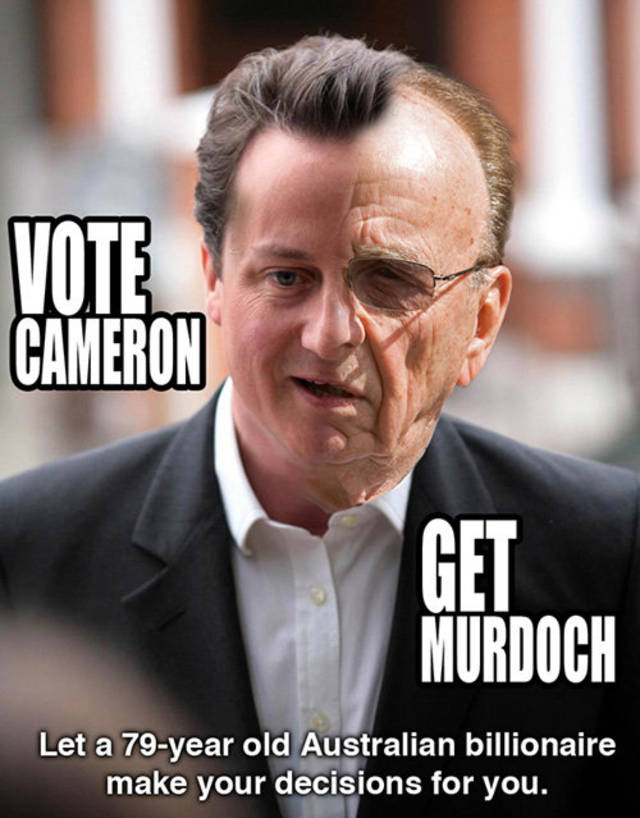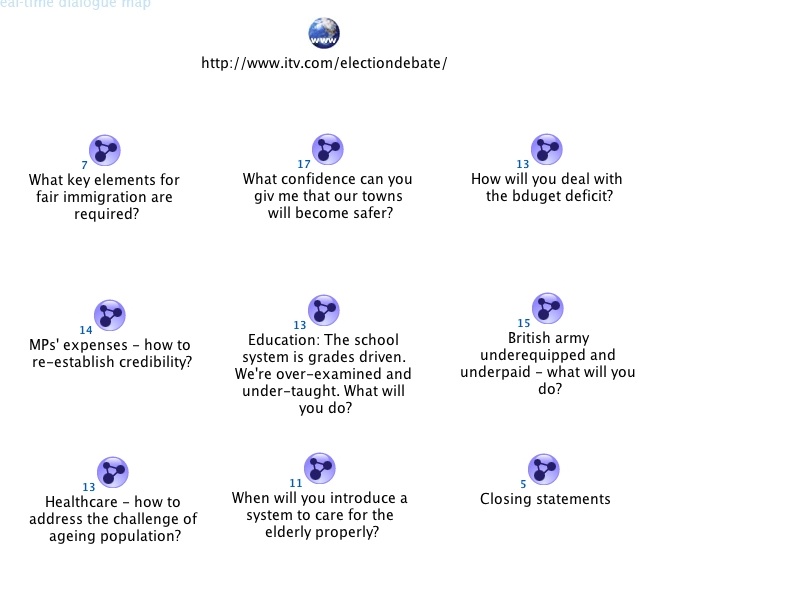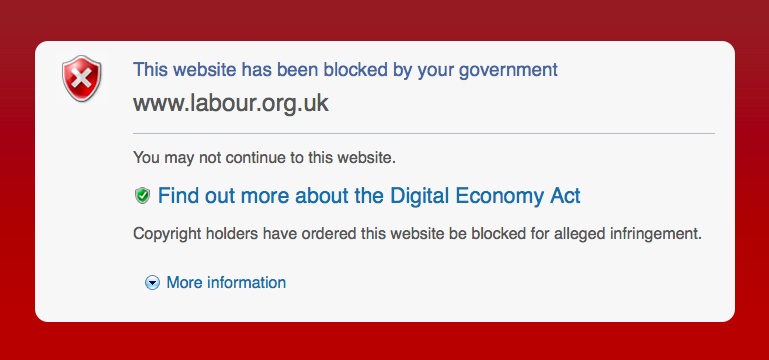One of the more comical aspects of the current UK election is the way ‘old’ media (newspapers and broadcast TV) gloated about how they had ‘transformed’ the election from the venerable two-party slugfest into a supposedly more open contest. There’s a note of triumphalism here: “see”, the dinosaurs are braying, “for all this talk of an ‘online election’, the impact of the Net, social networking, twitter etc. it’s really going to be decided by older, tried-and-trusted media”. There may be a lot of cyberchatter on Twitter and Facebook, the political editors jeer, but it’s not showing up on the doorstep.
Hmmm… I wonder. My perception, sitting as I do far away from Hothouse SW1, is that something’s different this time. It isn’t anything as obvious as the online phenomenon so brilliantly exploited by the Obama campaign. What’s happening is more subtle: it is that there’s been a significant change in the media ecosystem, and the broadcast boys — and much of the print media — haven’t really noticed it. There are two reasons for this. The first is that they are conditioned by the push-media mindset — which essentially assumes that those at the centre who create the messages are the only ones who count and those who receive them at the edges are essentially dumb and passive. The second reason is that they live in the same hermetically-sealed bubble as the political establishment, which to all intents and purposes constitutes a parallel universe to the one inhabited by the rest of us.
The televised debates have brought all this sharply into focus. The gloating, self-satisfaction of the TV crowd is so palpable, and somehow, so pathetic. All the hoopla: it’s like the Cup Final, the Cheltenham Gold Cup and the Oscars rolled into one. The vans with the satellite dishes; the neatly-coiffed and suited news anchors brought down to the West Country [the second debate took place in Bristol] to do ‘pieces to camera’ against the backdrop of the river Avon; the pre-match interviews with the referee, Adam Bolton of Sky — (“are you nervous?” he was asked in one particularly nauseating Radio 4 interview). And so on, ad nauseam.
And then the aftermath backstage in which spin doctors corralled in what Armando Ianucci memorably dubbed “spin alley” where they are solemnly ‘interviewed’ to give them an opportunity to explain why and how their man ‘won’. “The forces of spin in the room are so convulsive”, Ianucci writes,
“that they generate their own satellite spinners; last week, the shadow Home Secretary Chris Grayling was heard spinning that, in the practice debates where he was pretending to be Gordon Brown, he outclassed the real David Cameron. This week, a Labour sub-spinner spun that David Miliband would be replacing Peter Mandelson as the spinner for Gordon Brown, therefore reflecting the fact they were placing less emphasis on spin. If Dr Seuss ever wrote a stage play, it would look and sound like this.
Meantime, all the broadcast networks set up little pens inside which their reporters try to unspin what’s been spun in front of them and for the benefit of live TV cameras. Walking down the row, listening to the collective chirruping, it’s hard not to think that is what it would be like being locked inside a battery farm for the night.”
What’s changed is that this kind of thing — which used to be the essence of TV election coverage in the old days — now looks, well, both comical and pathetic. I mean to say, here are these guys telling us how the debate that we have all just watched ‘went’, as if we were dopes incapable of having our own responses. Further, they are telling us how we will respond (or have already responded via instant polling techniques) to it. What they don’t know is that I have been watching the debates alongside my Twitter buddies, and I have been attending — and contributing to — that backchannel throughout the debate and its aftermath. They don’t know, for example, that at one point someone tweeted that while watching the debate on HD he had suddenly wondered if David Cameron was trying to grow a moustache. In no time at all this meme had flourished and led to this.
Further, what the TV guys don’t know either is how ludicrous they have begun to seem in this new media environment, or the extent to which we are laughing at them. Suddenly a commentator like Nick Robinson [the BBC’s Political Editor] has begun to look like a politician giving a lecture to a school Assembly, the members of which have noticed — as he has not — that his flies are undone.
What old media seem to have forgotten, as Peter Preston points out in a coruscating Observer column this morning, is that
“The point of the debates is to let viewers see for themselves, and decide. Cue maybe an instant poll or five. Self-serving guff shouldn’t be on the menu.
But, alas, too many newspapers take us for mugs. Here’s the Sun, hailing “The Cam Back Kid”. Here’s the Mirror proclaiming that “Hapless Cam flops again”. Here’s the poll that happens to fit your prejudices, however vestigially. And here, trailing across the bottom of too many pages, are mini-verdicts from Sun security advisers, Sun cabbies and sundry predictable players, all parroting a script you could have written before the train left for Bristol.
Pause and ponder a potentially defining moment. Something has happened since this campaign began, something that’s turned the polls and assumed certainties topsy-turvy. You can scoff along Clegg/Obama/Churchill lines. You can wait for the balloon to burst. But meanwhile the old routines look crude, going on insulting.”
“Do what you do best and link to the rest” is Jeff Jarvis’s (excellent) advice to journalists and editors who are puzzled about how they should respond to the challenge of online media. What TV did best, in this particular context, was to stage the debate: only a broadcast (few-to-many) medium could do that. But where it struggles is in attempting to add value to that broadcast event. To date, it has fallen back on the old, pre-Internet, staples (studio discussions with bigwigs, spinmeisters and columnists) leavened with a smattering of new tech tools (for example, second-by-second reaction tracking). But, actually, the value added is trivial compared with what’s available on the Web and in social media. And the reason for that is simple: TV is a push medium; and the intellectual bandwidth of push media is inherently very narrow. As Neil Postman observed many years ago (and James Fallows also showed in his lovely book, Breaking the News
), you can’t do philosophy with smoke signals.





